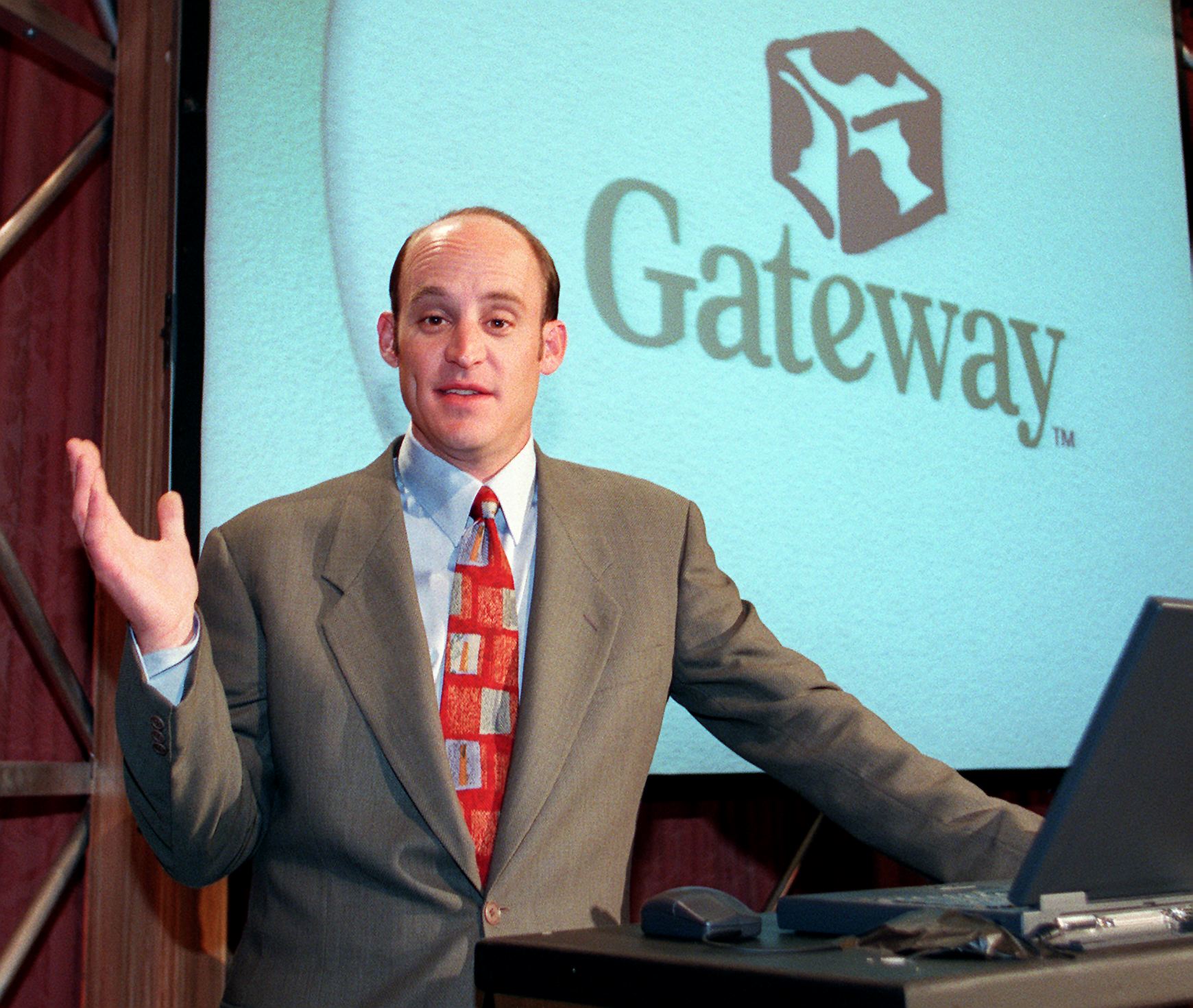Ted Waitt Net Worth: How A Tech Pioneer Built His Fortune
Have you ever wondered about the financial standing of those who shaped the early days of personal computing? It's a fascinating subject, really, to think about the people behind the tech giants we know today. Many individuals made significant contributions, and their stories often reveal a lot about innovation and determination. So, too it's almost, the wealth they accumulated becomes a point of curiosity for many.
When we look at figures like Ted Waitt, the name might spark a memory for some, especially those familiar with the rise of personal computers in the 1990s. He was a key player, you know, in that exciting time. His company, Gateway, became a household name, recognized for its distinctive cow-spotted boxes and direct-to-consumer sales model. That, is that, a pretty unique approach for its time, which really set them apart.
This article will explore the journey of Ted Waitt, focusing on his financial achievements and the ventures that contributed to his considerable wealth. We'll look at how he started, what made Gateway so successful, and what he's been involved with since. It's actually a story of vision and adaptability, which, in some respects, is quite inspiring for anyone interested in business.
Table of Contents
- Ted Waitt: A Brief Biography
- Personal Details and Bio Data
- The Gateway Era: Building a Tech Powerhouse
- From a Farm to a Fortune: How Gateway Grew
- Ted Waitt's Net Worth: The Numbers Behind the Legacy
- Beyond Gateway: New Ventures and Philanthropy
- Ted Waitt Today: Current Endeavors
- People Also Ask About Ted Waitt
Ted Waitt: A Brief Biography
Ted Waitt's story begins in Sioux City, Iowa, a rather humble start for someone who would later become a significant figure in the technology sector. He was born into a family with an entrepreneurial spirit, which, you know, often shapes a person's outlook early on. His father ran a farm equipment business, giving him an early look at how businesses operate.
He attended the University of Iowa, but like many successful entrepreneurs, he chose to leave before completing his degree. This decision, in fact, allowed him to pursue his ideas and passions without the traditional academic path. It shows a certain kind of drive, doesn't it?
In 1985, Ted Waitt, along with his co-founder Mike Hammond, started Gateway 2000 in a farmhouse in Iowa. This was, basically, the very beginning of what would become a massive computer company. They began by selling computer peripherals and later moved into assembling and selling personal computers directly to consumers. It was a bold move, really, for that time.
His vision for direct sales, cutting out the middleman, was a key factor in Gateway's early success. This approach allowed them to offer competitive prices and build a strong connection with their customers. It was, in a way, quite revolutionary for the industry back then, and it set a new standard for how computers could be sold.
Waitt served as the chairman and CEO of Gateway for many years, guiding the company through its rapid expansion and public offering. He was known for his distinctive management style and his commitment to the company's roots. That, is that, a big part of his persona, actually, the down-to-earth Midwestern approach.
Personal Details and Bio Data
| Full Name | Theodore W. Waitt |
| Born | January 18, 1963 |
| Birthplace | Sioux City, Iowa, USA |
| Nationality | American |
| Education | Attended University of Iowa (did not graduate) |
| Known For | Co-founder of Gateway, Inc. |
| Current Role | Founder and Chairman of Avalon Capital Group |
| Philanthropy | Waitt Foundation, Waitt Institute |
The Gateway Era: Building a Tech Powerhouse
The story of Gateway is really the core of Ted Waitt's financial journey. It began, as mentioned, in a farmhouse, a far cry from the Silicon Valley garages often associated with tech startups. This rural setting, in fact, gave Gateway a unique identity, something that resonated with many customers.
Gateway 2000, as it was initially known, focused on selling personal computers directly to consumers and businesses. This direct model was, you know, a pretty big deal. It meant they could avoid the costs associated with retail stores and pass those savings on to the customers. This made their products very appealing, especially in a growing market.
The company quickly gained recognition for its distinctive black-and-white cow-spotted boxes, which became a playful yet memorable brand image. This branding, you know, helped them stand out in a crowded market. It was a clever way to be remembered, honestly, and it worked.
Under Waitt's leadership, Gateway grew at an astonishing pace throughout the late 1980s and 1990s. They became one of the largest direct marketers of personal computers in the world. This growth was, quite frankly, phenomenal, showing just how much demand there was for affordable, accessible computers.
The company went public in 1993, a significant milestone that greatly increased Ted Waitt's personal wealth. The stock market's embrace of Gateway showed the confidence investors had in their business model and their leadership. It was, in some respects, a validation of everything they had built.
Gateway faced its share of challenges, too, especially as the personal computer market matured and competition intensified. Waitt navigated these periods with a hands-on approach, often making bold decisions to keep the company competitive. It's important to remember that, you know, even the biggest successes have their tough times.
He eventually stepped down as CEO in 1999, though he remained chairman. He returned as CEO in 2001 to try and turn the company around during a difficult period for the tech industry. This showed his deep commitment to the company he founded, a kind of loyalty that's pretty rare, actually.
Despite his efforts, Gateway struggled in the new millennium and was eventually acquired by Acer in 2007. However, Ted Waitt's impact on the company, and on the broader tech landscape, remains significant. He really left his mark, you know, on how computers were sold and perceived.
From a Farm to a Fortune: How Gateway Grew
The journey from a rural Iowa farmhouse to a multi-billion dollar company is a testament to Ted Waitt's business acumen and foresight. He saw an opportunity in the nascent personal computer market that others might have missed. That, is that, a critical element of any successful entrepreneur, you know, spotting trends early.
One of Gateway's initial advantages was its ability to build computers to order. Customers could customize their machines with specific components, something that wasn't widely available from larger manufacturers at the time. This flexibility, you know, gave them a real edge, and customers appreciated the personalized touch.
Their marketing strategy also played a crucial role. The cow-spotted boxes were memorable, but so were their advertisements, which often featured a down-home, approachable image. This contrasted sharply with the more corporate or technical marketing of their competitors. It was, in a way, a very human approach to selling technology.
Gateway's commitment to customer service was another cornerstone of its growth. They aimed to provide excellent support, building trust and loyalty among their user base. This focus on the customer experience, you know, helped them retain buyers and generate positive word-of-mouth, which is incredibly valuable.
The company expanded rapidly, opening manufacturing facilities and call centers across the United States and eventually internationally. This expansion was, in fact, necessary to keep up with the overwhelming demand for their products. They were, basically, scaling at an incredible pace.
Ted Waitt's leadership style was often described as unconventional but effective. He fostered a culture that was less formal than many corporate environments, which, you know, encouraged innovation and a strong sense of community among employees. It was a reflection of his own personality, actually.
The dot-com boom of the late 1990s further fueled Gateway's growth, as more people and businesses sought to get online. The demand for personal computers surged, and Gateway was well-positioned to meet it. It was, in some respects, a perfect storm of market conditions for them.
While the tech landscape changed dramatically in the 2000s, leading to Gateway's eventual sale, the foundation Ted Waitt built was robust. His early decisions and strategic vision laid the groundwork for a company that, for a time, challenged the biggest names in tech. It's a pretty remarkable achievement, really.
Ted Waitt's Net Worth: The Numbers Behind the Legacy
Estimating the precise net worth of individuals like Ted Waitt can be a bit tricky, as these figures often fluctuate with investments and market conditions. However, his wealth primarily stemmed from his significant ownership stake in Gateway, Inc. during its peak. When Gateway went public and its stock soared, so did his personal fortune. That, is that, how most tech founders accumulate vast wealth.
At the height of Gateway's success in the late 1990s, Ted Waitt was considered one of the wealthiest individuals in the United States. Various financial publications at the time estimated his net worth to be in the billions of dollars. For instance, some reports placed his peak net worth at around $2 billion or more. It's a very substantial amount, obviously.
Even after stepping away from daily operations at Gateway, his wealth remained significant due to his investments and other business ventures. While the value of his Gateway shares would have changed over time, his initial gains were substantial. He was, you know, set for life, in a way, after the IPO.
After Gateway, Waitt diversified his interests, investing in various sectors through his private investment firm, Avalon Capital Group. These investments, you know, would also contribute to his ongoing financial standing. It's a common move for successful entrepreneurs to branch out into new areas.
It's important to note that net worth figures are dynamic and can change based on the performance of investments, real estate holdings, and other assets. However, Ted Waitt's position as a billionaire was firmly established during the dot-com boom. He was, basically, a titan of the early PC industry, and his net worth reflected that.
While current, exact figures for `ted waitt net worth` are not always publicly updated in real-time by major financial trackers, his legacy as a self-made billionaire from the tech world is clear. His financial success is a direct result of his vision for direct-to-consumer computer sales. It's actually a pretty compelling example of how a simple idea can generate immense wealth.
His financial standing also allows him to pursue significant philanthropic endeavors, which we will discuss next. This is, you know, a common path for many who achieve such levels of success, to give back to causes they care about.
Beyond Gateway: New Ventures and Philanthropy
After his primary role with Gateway ended, Ted Waitt did not simply retire. He turned his attention to new business opportunities and, very notably, to philanthropy. This transition, you know, is something many successful business people do.
He founded Avalon Capital Group, a private investment company based in La Jolla, California. This firm manages his personal investments across a wide range of industries, including technology, real estate, and entertainment. It's a way, in some respects, to keep his business mind active and to continue growing his assets.
Avalon Capital Group has been involved in various projects, reflecting Waitt's diverse interests. These ventures show a continued entrepreneurial spirit, even after achieving such massive success with Gateway. He's, basically, always looking for the next opportunity, it seems.
Perhaps even more significant than his new business ventures is his commitment to philanthropy. Ted Waitt established the Waitt Foundation in 1993, long before he fully stepped away from Gateway. This foundation focuses on marine conservation and exploration. It's a cause he feels strongly about, apparently.
The Waitt Foundation supports scientific research and initiatives aimed at protecting the world's oceans. This includes funding expeditions, research projects, and public awareness campaigns. It's a really important area, you know, given the state of our planet's oceans.
He also founded the Waitt Institute, which is dedicated to ocean conservation and exploration through collaborative scientific research and communication. The Institute works with scientists and organizations globally to advance our understanding of marine ecosystems. This, is that, a very hands-on approach to giving back.
His philanthropic efforts also extend to other areas, including education and community development in his home state of Iowa. He has, in fact, made substantial contributions to various educational institutions and local projects. It shows a strong connection to his roots, which is pretty admirable, actually.
These post-Gateway activities highlight a shift in focus from building a corporate empire to making a broader impact on the world. It's a testament, you know, to how wealth can be used for significant positive change. His journey really shows that, at the end of the day, there's more to life than just accumulating money.
Ted Waitt Today: Current Endeavors
As of today, [Current Date: May 15, 2024], Ted Waitt continues to be active through his investment firm, Avalon Capital Group, and his philanthropic foundations. He maintains a relatively private profile compared to his days as a public tech CEO, but his influence persists. He's, you know, still very much involved behind the scenes.
His focus remains heavily on the work of the Waitt Foundation and the Waitt Institute, driving efforts in ocean conservation. These initiatives are, in fact, ongoing and continue to fund important research and projects globally. It's a long-term commitment, really, to a vital cause.
He also reportedly invests in various startup companies, particularly those in the technology and media sectors, through Avalon Capital. This keeps him connected to the world of innovation, which, in some respects, is where he made his name. He's still got that keen eye for new ideas, it seems.
While he is no longer at the helm of a massive public company, Ted Waitt's legacy as a pioneer in the personal computer industry is firmly established. His approach to direct sales and customer focus left a lasting mark on the business world. That, is that, something many people still talk about, actually.
His story serves as a reminder that significant wealth can be built from humble beginnings with a clear vision and a willingness to challenge established norms. It's a pretty inspiring narrative, you know, for anyone looking to make their mark. To learn more about business innovation on our site, and link to this page for more insights.
People Also Ask About Ted Waitt
Many people are curious about Ted Waitt, especially given his impact on the personal computer market. Here are some common questions folks often have about him and his legacy.
What happened to Gateway computers?
Gateway computers, after a period of significant success, faced increasing competition and market changes in the early 2000s. The personal computer market became more challenging, with tighter margins and shifting consumer preferences. Gateway struggled to adapt to these new conditions. Eventually, in 2007, the company was acquired by Acer Inc., a Taiwanese multinational hardware and electronics corporation. So, in a way, the brand continued under new ownership for a time, though its independent presence diminished.
Where is Ted Waitt now?
Ted Waitt is currently living in La Jolla, California, and is actively involved in his private investment firm, Avalon Capital Group. He also dedicates a substantial amount of his time and resources to his philanthropic endeavors, particularly through the Waitt Foundation and the Waitt Institute. These organizations focus on marine conservation and exploration, which, you know, is a big passion of his. He's pretty much out of the public corporate spotlight, but still very much engaged in business and charitable work.
How did Gateway 2000 get its name?
Gateway 2000 got its name from its location and its forward-looking vision. "Gateway" referred to the company's roots in the "Gateway to the West" region of the United States, specifically Iowa. The "2000" part was added to signify its aspiration to be a company of the future, looking ahead to the millennium. It was a common trend in the late 1980s and early 1990s to include "2000" in company names to suggest modernity and future relevance. That, is that, a pretty common marketing tactic from that era, actually.

Ted Waitt Net Worth in 2023 - Wiki, Age, Weight and Height

Ted Waitt Net Worth in 2023 - Wiki, Age, Weight and Height

Ted Waitt Net Worth in 2023 - Wiki, Age, Weight and Height